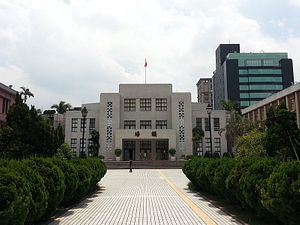A cross-strait trade agreement faced strong opposition in Taiwan on Tuesday, as hundreds of protestors (mostly students, according to Taiwanese reports) occupied Taiwan’s legislature in a sign of opposition to the deal. Want China Times called the incident “without precedent in the history of Taiwan’s legislature.” The Associated Press reported that the protestors broke into the legislature around 9 pm on Tuesday night, and repelled efforts by police to remove them. The protests so far have remained non-violent on both sides, although police and students reportedly engaged in shoving matches within the building.
The Cross-Strait Service Trade Agreement, the bill in question, has always been controversial. The legislation is a follow-up agreement to Taiwan President Ma Ying-jeou’s signature cross-strait achievement, the 2010 Economic Cooperation Framework Agreement, which greatly reduced trade barriers between Beijing and Taipei. The service agreement would continue along the same way by removing market barriers to various service industries, including communications, construction, health-related and social services, tourism, and financial services.
Ma’s policy of improving cross-strait economic ties has come under fire from the opposition Democratic Progressive Party (DPP), which believes Ma’s plan will result in crippling economic dependence on Beijing—thus increasing the chances of Taiwan being coerced into joining the People’s Republic of China. Of course, in addition to political concerns about Beijing, many opponents fear that the agreement will cost Taiwan jobs by giving Chinese companies increased access to the island’s market.
The political and economic repercussions of the services agreement have caused fierce debate among politicians and citizens alike. The original agreement was signed by the semi-official Straits Exchange Foundation and Association for Relations Across the Taiwan Straits back in June 2013, but opposition in Taiwan has prevented final legislative approval. According to a survey cited by the New York Times’ Sinosphere blog, nearly 45 percent of Taiwan residents oppose the services pact, with close to 33 percent in favor and 23 percent preferring not to respond.
The current round of protests was sparked by the majority Nationalist (KMT) Party’s decision to try and push the bill through the legislature once and for all. The protestors believe this move was in violation of a former agreement reached by the KMT and DPP whereby each clause of the bill would be reviewed separately. According to the Taipei Times, the protestors plan to continue their sit-in until Friday, when the next meeting of the legislature is scheduled to occur. Taipei Times also reported that the DPP and another, smaller opposition party, the Taiwan Solidarity Union (TSU), will boycott the Legislative Yuan until the KMT retracts the bill from the agenda. DPP Chairman Su Tseng-chang said that the DPP’s “goal to review the pact clause-by-clause and to renegotiate the deal remains unchanged.”
Meanwhile, the KMT has accused the DPP of stalling tactics and political obstructionism in its determination to prevent the service agreement from moving forward. A statement on the KMT’s website [Chinese] reiterated that the KMT has “always supported” examining and voting on the agreement piece by piece, and blamed the fact that the agreement still has not made it through the legislature process on the DPP’s “malicious boycott.” According to Focus Taiwan, on Tuesday (just before the protests broke out), senior KMT lawmaker Lin Hung-chih accused the DPP of trying to “strangle” the agreement, and said the KMT would not allow that. As for the protests themselves, the KMT accused the DPP of “encouraging the people to express their opinions through irrational actions.” “The DPP should receive strict condemnation” for this, the statement added.
The feud between the KMT and DPP over the service agreement has also contributed to a split within the KMT. A public legal battle between Ma Ying-jeou and Wang Jin-pyng, the speaker of the Legislative Yuan, was rumored to be motivated in part by Ma’s frustration at Wang’s patience with DPP opposition to the service pact. The legal feud between Wang and Ma was seriously damaging for Ma—especially as the courts recently decided in Wang’s favor, allowing him to keep his party membership and to continue serving as speaker.
As the KMT decides how best to deal with the backlash against the Cross-Strait Service Trade Agreement, Beijing will be watching closely. Should the protestors force reconsideration of the services pact, it would seriously call into questions Ma’s ability to deliver on cross-strait agreements negotiated with Beijing. This, in turn, would make such negotiations less palatable to Beijing—and might force a recalculation as to the value of coercive vs cooperative strategies to bring Taiwan back under PRC control.
































